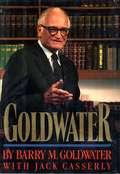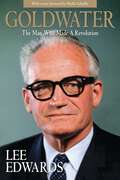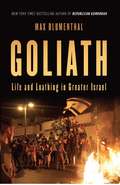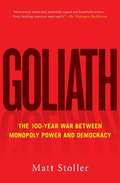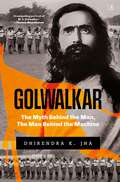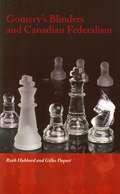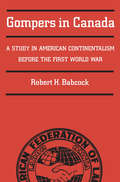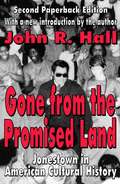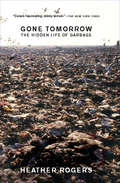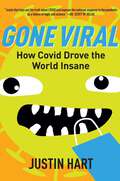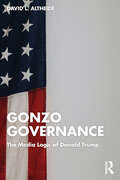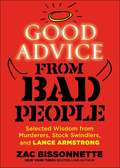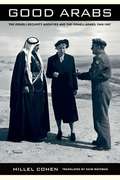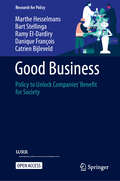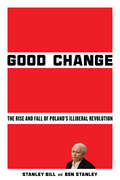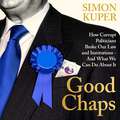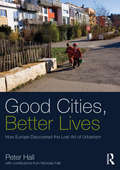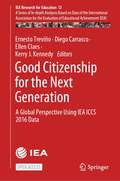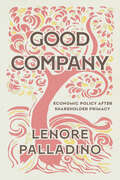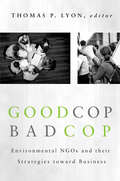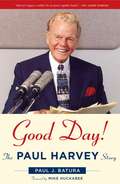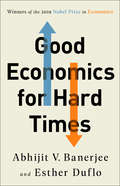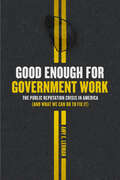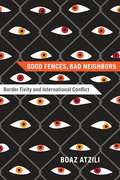- Table View
- List View
Goldwater
by Barry M. Goldwater Jack CasserlyBarry Goldwater was a defining figure in American public life, a firebrand politician associated with an optimistic brand of conservatism. In an era in which American conservatism has lost its way, his legacy is more important than ever. For over fifty years, in those moments when he was away from the political fray, Senator Goldwater kept a private journal, recording his reflections on a rich political and personal life. Here bestselling author John Dean combines analysis with Goldwater's own words. With unprecedented access to his correspondence, interviews, and behind-the-scenes conversations, Dean sheds new light on this political figure. From the late senator's honest thoughts on Richard Nixon to his growing discomfort with the rise of the extreme right, Pure Goldwater offers a revelatory look at an American icon---and also reminds us of a more hopeful alternative to the dispiriting political landscape of today.
Goldwater: The Man Who Made a Revolution
by Lee Edwards Foreword by Phyllis SchlaflyThe most comprehensive biography of Barry Goldwater ever written is back by popular demand with a new foreword by Phyllis Schlafly and an updated introduction by the author. Lee Edwards renders a penetrating account of the icon who put the conservative movement on the national stage. Replete with previously unpublished details of his life, Goldwater established itself as the definitive study of the political maverick who made a revolution.
Goliath (Trilogía Leviathan parte III)
by Scott Westerfeld Keith Thompson Raquel Solá GarcíaAlek y Deryn se encuentran a bordo del Leviathan cuando se le ordena a la aeronave que recoja a un extraño pasajero. El brillante aunque loco inventor afirma que tiene un arma llamada Goliath que puede terminar la guerra, pero ¿en qué bando está el científico en realidad? Mientras se encuentran en esa misión secreta, Alek finalmente descubre el secreto de Deryn profundamente guardado, en realidad dos, puesto que Deryn no es solo una chica disfrazada de chico? sino que también siente algo por Alek. La corona, el amor verdadero que siente por una plebeya y la destrucción de una gran ciudad, todo ello espera el siguiente y último movimiento de Alek.
Goliath: Life and Loathing in Greater Israel
by Max BlumenthalAn explosive expos(r) into the radical right-wing state of Israeli politics from bestselling author of "Republican Gomorrah. "
Goliath: The 100-Year War Between Monopoly Power and Democracy
by Matt Stoller&“Every thinking American must read&” (The Washington Book Review) this startling and &“insightful&” (The New York Times) look at how concentrated financial power and consumerism has transformed American politics, and business.Going back to our country&’s founding, Americans once had a coherent and clear understanding of political tyranny, one crafted by Thomas Jefferson and updated for the industrial age by Louis Brandeis. A concentration of power—whether by government or banks—was understood as autocratic and dangerous to individual liberty and democracy. In the 1930s, people observed that the Great Depression was caused by financial concentration in the hands of a few whose misuse of their power induced a financial collapse. They drew on this tradition to craft the New Deal. In Goliath, Matt Stoller explains how authoritarianism and populism have returned to American politics for the first time in eighty years, as the outcome of the 2016 election shook our faith in democratic institutions. It has brought to the fore dangerous forces that many modern Americans never even knew existed. Today&’s bitter recriminations and panic represent more than just fear of the future, they reflect a basic confusion about what is happening and the historical backstory that brought us to this moment. The true effects of populism, a shrinking middle class, and concentrated financial wealth are only just beginning to manifest themselves under the current administrations. The lessons of Stoller&’s study will only grow more relevant as time passes. &“An engaging call to arms,&” (Kirkus Reviews) Stoller illustrates here in rich detail how we arrived at this tenuous moment, and the steps we must take to create a new democracy.
Golwalkar: The Myth Behind the Man, The Man Behind the Machine
by Dhirendra K JhaFROM THE AUTHOR OF GANDHI'S ASSASSIN &‘A compelling portrait of M. S. Golwalkar.&’—Thomas Blom Hansen&‘…[biography of] one of the most secretive public figures of post-independence India.&’—Chistophe Jaffrelot&‘A disturbing book, because of its revelations on the inner working of the RSS.&’—Mridula Mukherjee Madhav Sadashiv Golwalkar, or Guruji as he is reverentially referred to by his followers, is regarded as the demi-god of Hindutva politics and often accorded a status higher than even the founder of the Rashtriya Swayamsevak Sangh, K. B. Hedgewar. In 1940, when 34-year-old Golwalkar unexpectedly assumed charge of the RSS on Hedgewar&’s death, the Hindu militia was still in its nascent stage, with pockets of influence mainly in Maharashtra. Under Golwalkar&’s leadership over the next three decades, the RSS and its allied organizations, known as the Sangh Parivar, extended its network across the entire country and penetrated almost every aspect of Indian society. Golwalkar&’s ideological influence was enormous—and it did not end with his death. Golwalkar&’s prescriptions in his incendiary book We or Our Nationhood Defined, published in 1939, now became central to the ideological training and radicalization of youth dedicated to the idea of a Hindu Rashtra. Here, Golwalkar prescribed a solution to India&’s &‘minority problem&’ based on the Nazi treatment of Jews in the Third Reich. As Dhirendra K. Jha conclusively establishes in this book, this would eventually provide the core of the Sangh&’s credo and, as events in the recent past have borne out, have a lasting influence on Indian politics. Drawing from a wealth of original archival material and interviews, the deeply researched and scholarly Golwalkar: The Myth Behind the Man, the Man Behind the Machine pierces through the many legends built around the man in the biographies written by his loyalists during his own lifetime. Jha traces Golwalkar&’s path from a directionless youth to a demagogue who plotted to capture political power by countering the secularist vision of nationalist leaders from Nehru to Gandhi. Ambitious, insecure, tactical and secretive—Jha draws a compelling and sinister portrait of one of the most prominent Hindutva leaders, and of the RSS and its worldview that evolved under him.
Gomery's Blinders and Canadian Federalism (Governance Series)
by Gilles Paquet Ruth HubbardIn 2004, Paul Martin asked Justice John Gomery to lead a public inquiry into potential misspending in the federal Sponsorship Program, a relatively small investment of taxpayers' money to try to convince Quebeckers of the benefits of Canadian federalism in the aftermath of the 1995 referendum on Quebec separation.The Gomery inquiry chose to focus exclusively on the sordid details of the money laundering and paid no attention to the deeper causes and sources of the problem: the dysfunctions of an existing centralized governing apparatus that is tearing the fabric of the country apart and the collusion of centralizing groups defending the status quo.
Gompers in Canada: a study in American continentalism before the First World War
by Robert H. BabcockSamuel Gompers, the charismatic chief of the American Federation of Labor at the turn of the century, claimed to represent the interests of all workers in North America, but it was not until American corporations began to export jobs to Canada via branch plants that he became concerned with representing Canadian workers. Within a very short time the Canadian labour movement was rationalized into a segment of the American craft-union empire. In order to secure the loyalty of these new recruits, the AFI reduced the national trade-union centre of Canada, the Trades and Labor Congress, to the level of an American state federation of labour. But Gombers failed to perceive the different political, historical, and cultural climates north of the forty-ninth parallel, and his policies inevitably generated friction. Although some Canadian workers felt sympathy for labour politicians inspired by left-wing doctrines and the social gospel movement, Gompers strove to keep Canadian socialists at bay. And although Canadian workers expressed considerable interest in governmental investigation of industrial disputes, Gompers remained inimical to such moves. Canadian labour groups desired a seat on international labour bodies, but Gompers would not allow them to speak through their own delegate. Canadian unions deemed rivals to AFL affiliates were banished. Dues were siphoned off into union treasuries in the US, and American labour leaders kept firm control over organizing efforts in Canada. Perhaps most importance, the AFL's actions at the TLC convention of 1902--its opposition to dual unionism--helped spawn a separate labour movement in Quebec. Yet by 1914, following nearly two decades of effort by Gompers, many Canadian workers had become his willing subjects. Though others struggled to loosen Gompers' grip on the Canadian labour movement, Canadian trade unions appeared firmly wedded to the AFL's continentalism . The story of Gompers in Canada has never been properly treated: this book is a significant addition to Canadian and American labour history and to the study of American expansion. Based upon exhaustive research in the Gompers papers, the AFL-CIO archives, and in various Canadian manuscript and newspaper sources, it clearly reveals one importance aspect of the growth of American's 'informal' empire at the turn of the century.
Gone From the Promised Land: Jonestown in American Cultural History (Second Edition)
by John R. HallIn this superb cultural history, John R. Hall presents a reasoned analysis of the meaning of Jonestown--why it happened and how it is tied to our history as a nation, our ideals, our practices, and the tension of modern culture. Hall deflates the myths of Jonestown by exploring how much of what transpired was unique to the group and its leader and how much can be explained by reference to wider social processes.
Gone Tomorrow: The Hidden Life of Garbage
by Heather Rogers&“A galvanizing exposé&” of America&’s trash problem from plastic in the ocean to &“wasteful packaging, bogus recycling, and flawed landfills and incinerators&” (Booklist, starred review). Eat a take-out meal, buy a pair of shoes, or read a newspaper, and you&’re soon faced with a bewildering amount of garbage. The United States is the planet&’s number-one producer of trash. Each American throws out 4.5 pounds daily. But garbage is also a global problem. Today, the Pacific Ocean contains six times more plastic waste than zooplankton. How did we end up with this much rubbish, and where does it all go? Journalist and filmmaker Heather Rogers answers these questions by taking readers on a grisly and fascinating tour through the underworld of garbage. Gone Tomorrow excavates the history of rubbish handling from the nineteenth century to the present, pinpointing the roots of today&’s waste-addicted society. With a &“lively authorial voice,&” Rogers draws connections between modern industrial production, consumer culture, and our throwaway lifestyle (New York Press). She also investigates the politics of recycling and the export of trash to poor countries, while offering a potent argument for change. &“A clear-thinking and peppery writer, Rogers presents a galvanizing exposé of how we became the planet&’s trash monsters. . . . [Gone Tomorrow] details everything that is wrong with today&’s wasteful packaging, bogus recycling, and flawed landfills and incinerators. . . . Rogers exhibits black-belt precision.&” —Booklist, starred review
Gone Viral: How Covid Drove the World Insane
by Justin HartData and marketing consultant and statistical sage to presidential candidates, governors, businesses, and the real powers-that-be, epidemiologists, Justin Hart catalogs in a terrifying-but-sprightly manner the folly and psychosis produced by the pandemic and diagnoses the societal destruction that the massive overresponse to the COVID virus has wreaked, as well as what can be done to stop the madness and bring the world back to a modicum of rationality.WORST. DISEASE. EVER. Someone broke America. In this nightmare, neighbors have turned into agoraphobes, teachers fear their students, children are muzzled, citizens are censored, dystopian fictions have become reality, and unelected officials are creating a biometric police state. Oh wait. It&’s not a nightmare. It&’s our daily lives! In truth, much of this insanity didn&’t start with the coronavirus pandemic (it was already latent in big government and big corporations) and it won&’t end there. COVID-19&’s greatest threat turned out to be . . . mental. All we had to fear was fear itself—and boy did some of us fear! The very idea of the virus weakened the immune system of America and revealed a decaying underbelly of confusion, panic, unease, and cowardice few of the strong ones suspected existed. What a horrible wake-up call! In a spate of anxious dread and gleeful power-grabbing, our health overlords threw away the pandemic response handbook and tried—beyond all reason—to protect, well, everyone. From massive over-testing to universal retail plexiglass to stay-at-home orders to stay-away-from-school orders to masking mandates to vaccine mandates to some of the worst restrictions on civil liberties in American history, this is an epic story that poses big questions about America&’s future as a free society. And the odd thing is, as Justin Hart shows, the actual disease was, as pandemics go, not that threatening; most people were at minimal risk. What is really scary is the total overreaction of half the country, many governments, that lost all sense of perspective. Hart offers a hopeful prescription on how we might face the madness down and claw our way back to sanity!
Gonzo Governance: The Media Logic of Donald Trump
by David L. AltheideDrawing on social science and communications theory, Gonzo Governance offers a new interpretation of Presidential power that shifts focus to the media dynamics that surrounded Donald Trump. The former President’s unhinged behavior and skilled media and digital manipulations changed the nature and process of significant governance at the federal and state levels, including denying election results and restricting voting opportunities. He went ‘Gonzo’ – promoting himself without regard for conventional norms and practices – and blasted ideological fault lines into explosive political fragments, resulting in so much dissensus that numerous legislators would not recognize the newly elected President Biden, nor would they agree to take a potential life-saving vaccine because it had been associated with a politicized virus, Covid-19. Nurtured by media logic and a communications ecology that has wedded people to digital technologies and formats that govern the structure, grammar, form, expectations, and meanings of messages that can entertain, enlighten, and disinform, this form of governance alters the fundamental way that information is communicated. David L. Altheide emphasizes how these changes informed Donald Trump’s electoral strategies as well as the insurrection attempt on the U.S. Capitol on January 6, 2021.
Good Advice from Bad People
by Zac BissonnetteGood Advice from Bad People is a daringly original humor book based on real quotes from murderers, stock swindlers, and other ne'er-do-wells. The world is full of people telling you how to live your life. Sometimes though, the advice-givers fall ever so slightly short themselves For instance:'The day you take complete responsibility for yourself, the day you stop making any excuse, that's the day you start to the top. ' O. J. Simpson, 1975'When you know what you are talking about, others will follow you, because it's safe to follow you. ' Lehman Brothers CEO Richard Fuld, 2006'I think the most important thing is restore a sense of idealism and end the cynicism. ' Future Illinois Governor Rod Blagojevich, 2002'It is easier to get into something than to get out of it. ' Donald Rumsfeld, 1974Bissonnette also includes risk management advice from the man who triggered the world's largest hedge fund collapse; a pair of #1 bestselling relationship experts who married each other and promptly divorced; and gay-prostitute-patronizing pastor Ted Haggard on how to build a marriage that will last a lifetime. The result will keep you smiling while you glean all the wisdom you need to build the life you want . . . if only you can follow it better than the people who gave it
Good Arabs: The Israeli Security Agencies and the Israeli Arabs, 1948-1967
by Haim Watzman Hillel CohenExposing the full extent of the crucial, and, until now, willfully hidden history of Palestinian collaboration with Israelis and of the Arab resistance to it, the book brings together the stories of activists, mukhtars, collaborators, teachers, and sheikhs.
Good Business: Policy to Unlock Companies’ Benefit for Society (Research for Policy)
by Marthe Hesselmans Catrien Bijleveld Bart Stellinga Ramy El-Dardiry Danique FrançoisThis open access book shows how governments can motivate companies to make a positive impact on society and why this is necessary in light of today&’s pressing social, economic and environmental challenges and transitions. It shows obstacles companies face in conducting socially responsible business. Focusing on government-business relations in the Netherlands, the book also exposes key policy bottlenecks: the tendency of the Dutch government to hold on to the status quo and shield incumbent firms through tax breaks and lax enforcement. There is a real risk of policies that pamper business: it hampers companies that offer societal innovations for instance for health, education or the labour market. We also show how policies can better capitalise on the innovative qualities of entrepreneurship. Effective government policy makes it worthwhile for companies to alter their business model so that their products, services and production processes benefit society. Our recommendations address the role of government, consumers, financiers and companies themselves. While this work focuses on the Netherlands, it tackles questions that countries face worldwide on how to minimise harmful business conduct and maximise good business solutions. This makes the book broadly relevant to policy makers, business leaders and researchers grappling with the impact of business on society today.
Good Change: The Rise and Fall of Poland’s Illiberal Revolution
by Stanley Bill Ben StanleyFew countries serve as a more useful case study for understanding the global tension between liberal and illiberal conceptions of democracy than Poland. Under the populist Law and Justice (PiS) –led government, a large part of the Polish electorate welcomed the party's "Good Change"—as it described its program—despite accusations of democratic backsliding. PiS offered voters neglected by previous governments a combination of economic redistributionism and cultural traditionalism, supplemented with narratives of bolstering Poland's national prestige and sovereignty. Yet after eight years of success, it was defeated in the October 2023 elections by a "pro-democratic" coalition. The history of PiS shows both the strengths and weaknesses of democratic illiberalism as a challenge to liberal democracy. Bill and Stanley analyze the course and causes of the party's successes and failures. The authors deftly outline PiS's assault on democratic institutions, its paradigm-changing redistributive programs, cultural backlash agenda, politics of history, and the reasons for its fall from power. Poland's democracy has proven resilient to the specter of autocratization, but its future development under a new government raises fresh questions. This essential book considers what the rise and fall of Poland's illiberal government reveals about the future of liberal democracy and its ongoing transformations in the twenty-first century.
Good Chaps: How Corrupt Politicians Broke Our Law and Institutions - And What We Can Do About It
by Simon KuperThe 'Good Chaps' theory holds that those who rise to power in the UK can be trusted to follow the rules and do the right thing. They're good chaps, after all. Yet Britain appears to have been taken over by bad chaps, and politics is awash with financial scandals, donors who have practically bought shares in political parties, and a shameless contempt for the rules.Simon Kuper, author of the Sunday Times Top Ten bestseller Chums, exposes how corruption took control of public life, and asks: how can we get politicians to behave like good chaps again?
Good Cities, Better Lives: How Europe Discovered the Lost Art of Urbanism (Planning, History and Environment Series)
by Peter HallThis book has one central theme: how, in the United Kingdom, can we create better cities and towns in which to live and work and play? What can we learn from other countries, especially our near neighbours in Europe? And, in turn, can we provide lessons for other countries facing similar dilemmas? Urban Britain is not functioning as it should. Social inequalities and regional disparities show little sign of going away. Efforts to generate growth, and spread it to the poorer areas of cities, have failed dismally. Much new urban development and redevelopment is not up to standard. Yet there are cities in mainland Europe, which have set new standards of high-quality sustainable urban development. This book looks at these best-practice examples – in Germany, the Netherlands, France and Scandinavia, – and suggests ways in which the UK and other countries could do the same. The book is in three parts. Part 1 analyses the main issues for urban planning and development – in economic development and job generation, sustainable development, housing policy, transport and development mechanisms – and probes how practice in the UK has fallen short. Part Two embarks on a tour of best-practice cities in Europe, starting in Germany with the country’s boosting of its cities’ economies, moving to the spectacularly successful new housing developments in the Netherlands, from there to France’s integrated city transport, then to Scandinavia’s pursuit of sustainability for its cities, and finally back to Germany, to Freiburg – the city that ‘did it all’. Part Three sums up the lessons of Part Two and sets out the key steps needed to launch a new wave of urban development and regeneration on a radically different basis.
Good Citizenship for the Next Generation: A Global Perspective Using IEA ICCS 2016 Data (IEA Research for Education #12)
by Kerry J. Kennedy Ernesto Treviño Diego Carrasco Ellen ClaesThis Open Access book presents an international group of scholars seeking to understand how youth from different cultures relate to modern multidimensional concepts of citizenship, and the roles that education and society have in shaping the views of the world’s future citizens. The book also explores how different aspects of citizenship, such as attitudes towards diverse population groups and concerns for social issues, relate to classical definitions of norm-based citizenship from the political sciences. Authors from Asia, Europe, and Latin America provide a series of in-depth investigations into how concepts of “good citizenship” are shaped in different regions of the globe, using the rich comparative data from the IEA’s International Civic and Citizenship Study (ICCS) 2016. In twelve chapters, the authors review the concept of “good citizenship”; how citizenship norms adherence is configured into profiles across countries; and what country, school, and background factors are related to how students adhere to citizenship norms. Recognizing contingent social and political situations in specific regions of the world, the present books offer six chapters where authors apply their expertise to offer locally relevant and pertinent observations on how young people from diverse cultures understand and relate to different dimensions of citizenship in countries of Asia, Europe, and Latin America. The present book is of relevance for different audiences interested in civic education and political socialization, including social sciences and education, integrating topics from political science, sociology, political psychology, and law.
Good Company: Economic Policy after Shareholder Primacy
by Lenore PalladinoOn the faulty intellectual origins of shareholder primacy—and how policy can win back what’s been lost. In an era of shareholder primacy, share price is king. Businesses operate with short-term goals to deliver profits to shareholders, enjoying stability (and bonuses) in the process. While the public bemoans the doctrine for its insularity and wealth-consolidating effects, its influence over corporate governance persists. Good Company offers an exacting argument for why shareholder primacy was never the right model to follow for truly understanding how corporations operate. Lenore Palladino shows that corporations draw power from public charters—agreements that allow corporations to enjoy all manner of operational benefits. In return, companies are meant to innovate for the betterment of the societies that support them. However, that debt—increasingly wielded for stock buybacks and shareholder bonuses—is not being repaid. Palladino theorizes a modern corporation that plays its intended role while delivering social and economic good in the process and offers tangible policy solutions to make this a reality. Good Company is both an expert introduction to the political economy of the firm—as it was, as it is, as it can be—and a calibrating examination of how public policy can shape companies, and societies, for the better.
Good Cop/Bad Cop: Environmental NGOs and Their Strategies toward Business
by Thomas LyonNon-governmental organizations (NGOs) play an increasingly prominent role in addressing complex environmental issues such as climate change, persistent bio-accumulative pollutants, and the conservation of biodiversity. At the same time, the landscape in which they operate is changing rapidly. Markets, and direct engagement with industry, rather than traditional government regulation, are often the tools of choice for NGOs seeking to change corporate behavior today. Yet these new strategies are poorly understood-by business, academics, and NGOs themselves. How will NGOs choose which battles to fight, differentiate themselves from one another in order to attract membership and funding, and decide when to form alliances and when to work separately? In Good Cop/Bad Cop, Thomas P. Lyon brings together perspectives on environmental NGOs from leading social scientists, as well as leaders from within the NGO and corporate worlds, to assess the state of knowledge on the tactics and the effectiveness of environmental groups. Contributions from Greenpeace, Rainforest Action Network, the Environmental Defense Fund, and the World Wildlife Fund describe each organization?s structure and key objectives, and present case studies that illustrate how each organization makes a difference, especially with regard to its strategies toward corporate engagement. To provide additional perspective, high-level executives from BP and Ford share their views on what causes these relationships between companies and NGOs to either succeed or fail. For students of the social sciences and NGO practitioners, this book takes an important step in addressing an urgent need for objective study of NGO operations and their effectiveness.
Good Day!
by Paul Batura"Hello Americans, I'm Paul Harvey."He was the voice of an era. Millions grew up listening to Paul Harvey News and Comment and The Rest of the Story, and trusted the great man who spoke for the little guy.Good Day! by Paul J. Batura follows the remarkable life of one of the founding fathers of the news media. Paul Harvey started his career during the Great Depression and narrated America's story day by day, through wars and peace, the threat of communism and the crumbling of old colonial powers, consumer booms and eventual busts. In Good Day!, you'll follow,* How he became "Paul Harvey"* The remarkable adversity he confronted in his early years* How he revolutionized the radio industry with his wife, Evelyn* How a president wanted to "roast" him "good"* How he was nearly jailed for pursuing a scoopPaul J. Batura's Good Day! is a colorful biography of the radio pioneer-turned-legend whose guiding light saw the country through dark times. Whether he was covering racial tensions, terrorist attacks, or which vitamins to take, Paul Harvey articulated the American experience for average people making their way in a world too large for quick comprehension. Harvey brought them that world "in dime store words," with a sense of optimism and faith, and with a deep love for America. Here is Harvey's story, the rest of the story, as he would tell it himself.
Good Economics for Hard Times: Six Ways We Get The World Wrong And How To Set It Right
by Esther Duflo Abhijit V. BanerjeeThe winners of the Nobel Prize show how economics, when done right, can help us solve the thorniest social and political problems of our day.Figuring out how to deal with today's critical economic problems is perhaps the great challenge of our time. Much greater than space travel or perhaps even the next revolutionary medical breakthrough, what is at stake is the whole idea of the good life as we have known it.Immigration and inequality, globalization and technological disruption, slowing growth and accelerating climate change--these are sources of great anxiety across the world, from New Delhi and Dakar to Paris and Washington, DC. The resources to address these challenges are there--what we lack are ideas that will help us jump the wall of disagreement and distrust that divides us. If we succeed, history will remember our era with gratitude; if we fail, the potential losses are incalculable.In this revolutionary book, renowned MIT economists Abhijit V. Banerjee and Esther Duflo take on this challenge, building on cutting-edge research in economics explained with lucidity and grace. Original, provocative, and urgent, Good Economics for Hard Times makes a persuasive case for an intelligent interventionism and a society built on compassion and respect. It is an extraordinary achievement, one that shines a light to help us appreciate and understand our precariously balanced world.
Good Enough for Government Work: The Public Reputation Crisis in America (And What We Can Do to Fix It) (Chicago Studies in American Politics)
by Amy E. LermanAmerican government is in the midst of a reputation crisis. An overwhelming majority of citizens—Republicans and Democrats alike—hold negative perceptions of the government and believe it is wasteful, inefficient, and doing a generally poor job managing public programs and providing public services. When social problems arise, Americans are therefore skeptical that the government has the ability to respond effectively. It’s a serious problem, argues Amy E. Lerman, and it will not be a simple one to fix. With Good Enough for Government Work, Lerman uses surveys, experiments, and public opinion data to argue persuasively that the reputation of government is itself an impediment to government’s ability to achieve the common good. In addition to improving its efficiency and effectiveness, government therefore has an equally critical task: countering the belief that the public sector is mired in incompetence. Lerman takes readers through the main challenges. Negative perceptions are highly resistant to change, she shows, because we tend to perceive the world in a way that confirms our negative stereotypes of government—even in the face of new information. Those who hold particularly negative perceptions also begin to “opt out” in favor of private alternatives, such as sending their children to private schools, living in gated communities, and refusing to participate in public health insurance programs. When sufficient numbers of people opt out of public services, the result can be a decline in the objective quality of public provision. In this way, citizens’ beliefs about government can quickly become a self-fulfilling prophecy, with consequences for all. Lerman concludes with practical solutions for how the government might improve its reputation and roll back current efforts to eliminate or privatize even some of the most critical public services.
Good Fences, Bad Neighbors
by Boaz AtziliBorder fixity--the proscription of foreign conquest and the annexation of homeland territory--has, since World War II, become a powerful norm in world politics. This development has been said to increase stability and peace in international relations. Yet, in a world in which it is unacceptable to challenge international borders by force, sociopolitically weak states remain a significant source of widespread conflict, war, and instability. In this book, Boaz Atzili argues that the process of state building has long been influenced by external territorial pressures and competition, with the absence of border fixity contributing to the evolution of strong states--and its presence to the survival of weak ones. What results from this norm, he argues, are conditions that make internal conflict and the spillover of interstate war more likely. Using a comparison of historical and contemporary case studies, Atzili sheds light on the relationship between state weakness and conflict. His argument that under some circumstances an international norm that was established to preserve the peace may actually create conditions that are ripe for war is sure to generate debate and shed light on the dynamics of continuing conflict in the twenty-first century.
